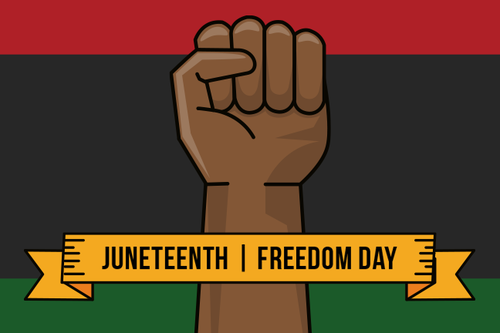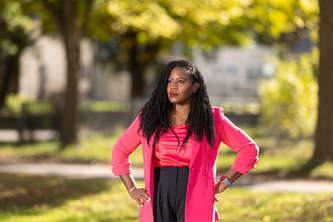
As we reflect on the history of Juneteenth (June 19), Professor Keith Mayes in African American & African Studies in the College of Liberal Arts offers this description:
“On June 19, 1865, General Gordon Granger arrived in Galveston, Texas, to read a military order that stated enslaved Africans were free. This marks the beginning of Jubilee Day, or what became known as Juneteenth Day celebrations in Black communities in east Texas and across the United States. Juneteenth is part of a long tradition of Freedom Day celebrations in the U.S., commemorating significant events in African American history. Juneteenth has become a fixture of the black protest calendar and black history tradition, which includes Kwanzaa, Martin Luther King Jr. Day, and Black History Month.”
Known as "America's second Independence Day," Juneteenth occurred more than two years after President Abraham Lincoln issued the Emancipation Proclamation.
In Minnesota, Juneteenth celebrations are taking place across the Twin Cities and beyond, with a focus on supporting and celebrating Black communities. Juneteenth is commemorated in many ways, including community-led events and gatherings. Remembrance of ancestors, reflection, and knowledge of Black history are at the heart of this day.
University of Minnesota Libraries offers a number of resources through its renowned Givens Collection of African American Literature and Umbra Search African American History, a national search tool of African American sources created by the Givens Collection; and through materials gathered by Umbra Search partner Colored Conventions. Learn more about Juneteenth and find University resources below.
Juneteenth resources from U of M Libraries
Juneteenth: Fact Sheet, Library of Congress. Congressional Research Service, Washington: U.S. Government Printing Office, 2017
Kumbayah—the Juneteenth story, a play by Rose McGee, Minneapolis, MN, 1998. This play within a play opens in the present time in a Minneapolis soul-food restaurant where a group of youth discuss the meaning of Juneteenth. They decide to attend a play on the subject, and the story shifts into the American Civil War era, with Frederick Douglass as narrator. Givens Collections of African American Literature.
Juneteenth: a novel by Ralph Ellison, published posthumously in 1999. In Washington, D.C., in the 1950s, Adam Sunraider, a race-baiting senator from a New England state, is mortally wounded by an assassin's bullet while making a speech on the Senate floor. To the shock of all who think they know him, Sunraider calls out from his deathbed for Hickman, an old black minister, to be brought to his side. Full text available from Hathi Trust.
Juneteenth Texas: essays in African American folklore Publications of the Texas Folklore Society; no. 54, 1996. Full text available from Hathi Trust.
Juneteenth jamboree, 1995. Cassandra and her family have moved to her parents' hometown in Texas, but it doesn't feel like home to Cassandra until she experiences Juneteenth, a Texas tradition celebrating the end of slavery. Children’s Literature Research Collections.
Juneteenth: freedom day, 1998. Discusses the origin and present-day celebration of Juneteenth. Children’s Literature Research Collections.
Additional critical resources
All God’s dangers: the life of Nate Shaw, by Nate Shaw; Theodore Rosengarten. Available from Hathi Trust through lib.umn.edu. And: Givens Collection Narratives by Formerly Enslaved People, Commissioned by the Federal Writers’ Project, 1937.
Report of the National Advisory Commission on Civil Disorders. Washington, D.C., 1968.
James Baldwin at Berkeley High School, 1979 (video).
W.E.B. DuBois’s notes tracking lynchings in 1927, for The Crisis Magazine: A Record of the Darker Races.
Proceedings of Convention of Colored Citizens of the State of Minnesota, in Celebration of the Anniversary of Emancipation, and the Reception of the Electoral Franchise, on the First of January, 1869.
Learn more with U of M Libraries Anti-Racism Reading Lists.
- Categories:
- Campus Affairs





